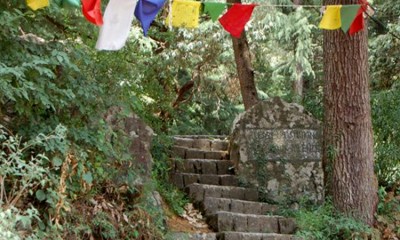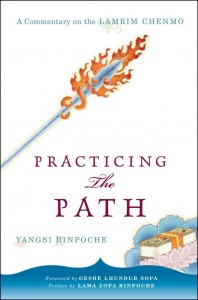by Namdrol Miranda Adams, Dean of Education
In the first months of the year 2000, about 50 students from all corners of the globe huddled in the meditation hall at Tushita Meditation Centre in Dharamsala, India.

Stairs up to Tushita Meditation Centre, India
We were all in various states of fear, joy, and expectation, having untethered ourselves from our daily lives in other places for the next two months to come to India, receive daily teachings, and be led in meditation and practice in retreat on the lamrim, the graduated path to enlightenment, by our teacher Yangsi Rinpoche. In retrospect, this was a rare and exceptional moment in time, when the causes and conditions ripened for a group of mostly well-intentioned but pretty wild western students from all walks of life to come together with a known master of the tradition to immerse ourselves in the teachings of Buddha: to not only hear them, but also to reflect on them deeply and to do our best to conceptualize how we would then put them into practice during the next parts of our lives, together.
I, personally, was 24 years old, newly ordained (I am no longer a nun, but spent seven very happy years practicing this way), and remember waking up every day with a visceral feeling of joy and astonishment at my good fortune to be there. From before dawn until after dusk every day for two months the group of us listened, discussed, meditated, and practiced together with great authenticity, albeit varying levels of skill. It was an extraordinary experience both because we were immersing ourselves in this amazing tradition all day, every day for two full months, and also because we were doing it together, in community, a ragtag group of strangers from all around the world who had similarly decided to try something different in a pretty remarkable way.
We had looked at the world around us, at the realities we were living in, and decided that we needed more tools to not only just survive, but also to try to make things better.
That was almost 20 years ago. In the years that have passed, countless miracles have taken place in the lives of this group, including many lives dedicated towards a path for the welfare of all, marriages, children, ordinations, communities, and the publication of a modern lamrim manual based upon Yangsi Rinpoche’s retreat teachings. Most especially relevant here, the project of Maitripa College has arisen.
Maitripa College is a learning community founded in the Pacific Northwest by Yangsi Rinpoche and dedicated to the education of every students’ heart and mind through a unique pedagogy focused on study, contemplation, and service. Maitripa College is a place unique in the world for holding as core to its mission not only a focus on accumulating knowledge of the Buddhist path, but also a focus on its practice, to whatever degree is comfortable for those who come. Maitripa College is a place where, like in the retreat in India, each person is gently introduced to the reality of the preciousness they hold inside of them.
As Dharmakirti says:
The nature of mind is clear,
And all the defilements are adventitious.
From Practicing the Path:
Sentient beings do not know the true natures of their own minds, and it is this not-knowing that causes so much of the suffering that we experience in cyclic existence. According to Buddhism, the mind of every sentient being is ultimately empty of inherent existence, and, on the conventional level, is luminous, clear, and knowing. In addition to that, all of the delusions in our minds that bind us to this existence in the ways that we have just discussed are temporary and adventitious. The luminous nature of the mind and the fact that the delusions are temporary corroborate the fact that as long as one is a sentient being, one has the potential to become enlightened…These points may help us to keep in mind the fact that the entire path to enlightenment must be cultivated within our own minds. Whatever negativities need to be extinguished must be done so within our own minds. The main objective of Dharma practice is limitlessly developing the positive potential within our minds. The mind can be limitlessly developed because its mental continuum is beginningless and without end, and because it is endowed with buddha-nature.

For more from Practicing the Path, Yangsi Rinpoche’s commentary on the Lamrin Chenmo, click here: >more


